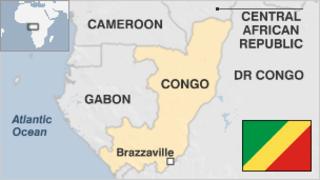Republic of Congo profile
Civil wars and militia conflicts have plagued the Republic of Congo, which is sometimes referred to as Congo-Brazzaville.
Nearly half the population lives in poverty, according to the World Bank, even though the Republic of Congo is one of sub-Saharan Africa’s main oil producers.
Oil is the mainstay of the economy and in recent years the country has tried to increase financial transparency in the sector.
FACTS
Republic of the Congo
Capital: Brazzaville
Population 5 million
Area Area: 342,000 sq km (132,047 sq miles)
Major languages French, indigenous African languages
Major religions Christianity, indigenous African beliefs
Life expectancy 63 years (men), 66 years (women)
Currency CFA (Communaute Financiere Africaine) franc
LEADER
President: Denis Sassou Nguesso
Denis Sassou Nguesso is one of Africa’s longest-serving leaders, having first come to power almost four decades ago.
He was installed as president by the military in 1979 and lost his position in the country’s first multi-party elections in 1992.
He returned to power in 1997 after a brief but bloody civil war in which he was backed by Angolan troops.
He gained his latest seven-year term after elections in March 2016.
Constitutional changes to allow him to stand for another term were condemned by the opposition as a constitutional coup.
A French-trained paratrooper colonel, Mr Sassou Nguesso is seen as a pragmatist. During his first presidency in 1979-92 he loosened the country’s links with the Soviet bloc and gave French, US and other Western companies roles in oil exploration and production.
But he has also been dogged by corruption allegations. In May 2009, a French judge announced an investigation into whether Mr Sassou Nguesso and two other African leaders – all of whom deny wrongdoing – had plundered state coffers to buy luxury homes and cars in France.
MEDIA
Scores of privately-owned radio and TV stations operate alongside the state broadcaster but they are under pressure to self-censor, says Reporters Without Borders.
Facebook is the leading social media network.
TIMELINE
Some key dates in the Congo’s history:
1400s – Bakongo, Bateke and Sanga ethnic groups arrive in what is now the Republic of Congo.
1880 – French explorer Pierre Savorgnan de Brazza negotiates an agreement with the Bateke to establish a French protectorate over the north bank of the Congo River. Thirty years later the territory, then known as Middle Congo, becomes a colony of French Equatorial Africa.
1960 – Congo becomes independent with Fulbert Youlou as president.
1963 – President Fulbert Youlou forced to resign following workers’ unrest; Alphonse Massamba-Debat becomes president and Pascal Lissouba prime minister. The head of state changes frequently over the next 30 years, due to coups and at least one assassination.
1997 – Full-scale civil war breaks out; forces of Denis Sassou Nguesso, aided by Angolan troops, capture Brazzaville, forcing Lissouba to flee.
2001 – Peace conference ends by adopting a new constitution, paving the way for presidential and parliamentary elections. The following year, Denis Sassou Nguesso wins presidential elections unopposed after his main rivals are barred from the contest.
2010 – French appeal court gives go-ahead for probe into corruption charges against three African leaders, including President Denis Sassou Nguesso.
2015 – A national dialogue called by President Sassou Nguesso and boycotted by the opposition recommends changing the constitution to allow him to stand for another term.
Source: Read Full Article



